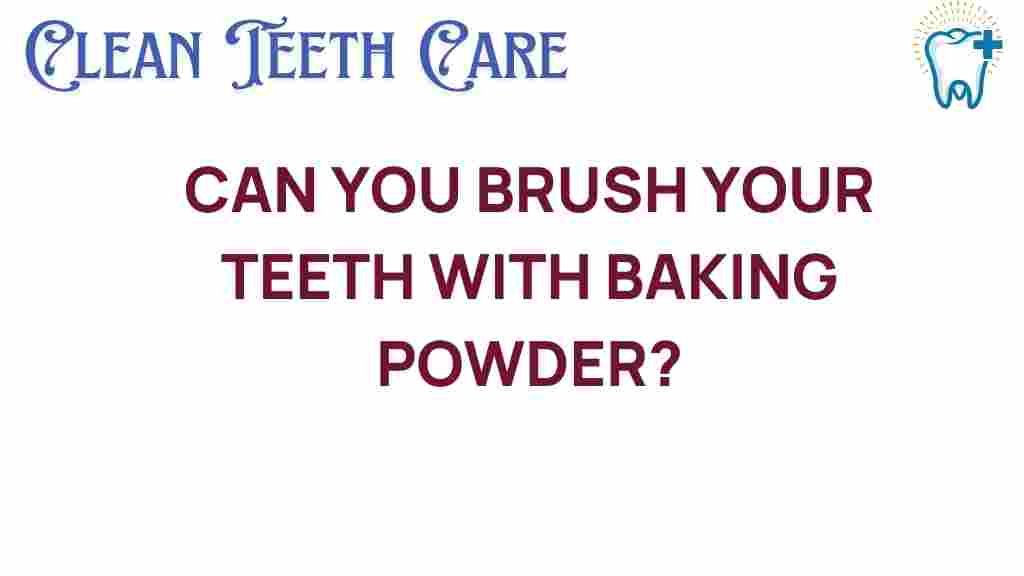The Surprising Truth: Can You Brush Your Teeth with Baking Powder?
Oral hygiene is crucial for maintaining healthy teeth and gums. Most people are familiar with traditional toothpaste, but there are alternative methods that some consider for dental care. One such method is using baking powder. But can you really brush your teeth with baking powder? In this article, we’ll explore the truth behind this natural remedy for teeth whitening and discuss its effects on tooth enamel, fluoride, and overall dental health.
Understanding Baking Powder and Its Uses
Baking powder is a common household ingredient primarily used in baking. It is a leavening agent that helps dough rise by producing carbon dioxide when it comes into contact with a liquid. However, its properties extend beyond the kitchen. Many people have turned to baking powder for various health tips, including oral hygiene.
While baking powder and baking soda are often confused, they are not the same. Baking soda (sodium bicarbonate) is a pure compound, whereas baking powder contains sodium bicarbonate along with an acidifying agent and a moisture absorber. For dental care, baking soda is typically the more recommended ingredient due to its abrasive qualities and alkalinity, which can help neutralize acids in the mouth.
How Baking Powder Affects Oral Hygiene
When considering baking powder for brushing teeth, it’s essential to understand its potential benefits and drawbacks:
- Teeth Whitening: Baking powder has mild abrasive properties that can help remove surface stains on teeth, contributing to a brighter smile.
- Neutralizing Acids: It can help neutralize acids in the mouth, potentially reducing the risk of cavities and gum disease.
- Freshening Breath: Baking powder may help eliminate bad breath by combating bacteria in the mouth.
Brushing Your Teeth with Baking Powder: A Step-by-Step Process
If you’re curious about how to use baking powder for your oral hygiene routine, here’s a simple step-by-step process:
Step 1: Gather Your Materials
You will need:
- 1 teaspoon of baking powder
- A small amount of water (or coconut oil for a different consistency)
- A soft-bristled toothbrush
Step 2: Mix the Ingredients
In a small bowl, combine the baking powder with enough water to form a paste. If you prefer a different texture, you can use coconut oil instead of water.
Step 3: Brush Your Teeth
Dip your toothbrush into the baking powder mixture and brush your teeth gently for about two minutes. Make sure to cover all surfaces of your teeth while avoiding excessive pressure to protect your tooth enamel.
Step 4: Rinse Thoroughly
After brushing, rinse your mouth thoroughly with water to remove any residue. It’s essential to ensure that no baking powder is left on your teeth.
Potential Risks and Precautions
While using baking powder occasionally may offer some benefits, there are potential risks to consider:
- Tooth Enamel Erosion: The abrasive nature of baking powder can wear down tooth enamel over time, especially if used too frequently.
- Fluoride Deficiency: Regular toothpaste contains fluoride, which helps protect against cavities. Relying solely on baking powder may lead to insufficient fluoride exposure.
- Gum Irritation: If you have sensitive gums or existing dental issues, using baking powder may cause irritation.
When to Avoid Baking Powder
It’s best to avoid using baking powder if you experience:
- Tooth sensitivity
- Gum disease or inflammation
- Recent dental work
Alternative Methods for Teeth Whitening and Oral Hygiene
If you’re looking for natural remedies for dental care, consider these alternatives:
- Baking Soda: A safer alternative to baking powder, baking soda can effectively whiten teeth with less risk of enamel erosion.
- Activated Charcoal: This natural ingredient is gaining popularity for its teeth whitening properties, though it should be used sparingly.
- Coconut Oil Pulling: Swishing coconut oil in your mouth can help reduce bacteria and improve oral health.
- Hydrogen Peroxide: Diluted hydrogen peroxide can be used as a mouthwash for its antibacterial properties and whitening effects.
Always consult with a dentist before trying new methods to ensure they are suitable for your dental health.
Health Tips for Maintaining Good Oral Hygiene
In addition to exploring alternative methods, here are some essential health tips for maintaining good oral hygiene:
- Brush Twice Daily: Use fluoride toothpaste and brush your teeth for at least two minutes each time.
- Floss Daily: Flossing helps remove food particles and plaque between teeth, where a toothbrush can’t reach.
- Regular Dental Check-ups: Visit your dentist at least twice a year for cleanings and check-ups.
- Limit Sugary Foods and Drinks: Reducing sugar intake can significantly lower your risk of cavities.
- Stay Hydrated: Drinking water helps wash away food particles and bacteria in your mouth.
Troubleshooting Common Issues
If you decide to try baking powder for your oral hygiene routine, here are some troubleshooting tips for common issues:
Problem: Sensitivity After Use
If you experience tooth sensitivity after using baking powder, reduce the frequency of use and consult your dentist for personalized advice.
Problem: Bad Taste or Residue
If you find that baking powder leaves a bad taste or residue, make sure to rinse thoroughly after brushing. If the issue persists, consider switching to a different natural remedy.
Conclusion
Brushing your teeth with baking powder can be a surprising alternative method for whitening teeth and promoting oral hygiene. However, it’s essential to proceed with caution, as overuse can lead to enamel erosion and sensitivity. Always prioritize fluoride toothpaste and consult your dentist for personalized advice. For more information on maintaining your dental health, consider exploring additional resources like this dental care guide.
Ultimately, while baking powder can provide some benefits, it should be used responsibly as part of a broader commitment to good oral hygiene practices.
This article is in the category Hygiene and created by CleanTeethCare Team
